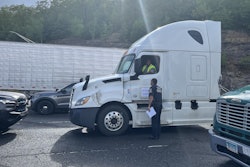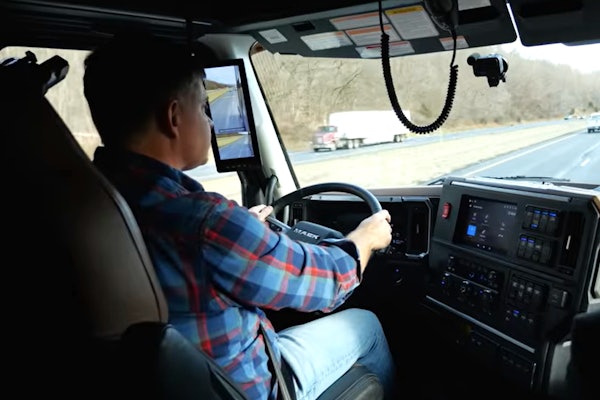The Federal Motor Carrier Safety Administration last month canceled its Sexual Assault and Sexual Harassment study, saying it focused on Diversity, Equity and Inclusion themes and "advancing a transgender ideology" in a move that came as a shock to the study's participants.
FMCSA's CMV Driver Sexual Assault and Sexual Harassment (SASH) project sought "information on how best to design and conduct a study to comprehensively identify issues and potential solutions for supporting truck drivers," specifically women "with problems of sexual assault and sexual harassment."
That study, launched under the previous presidential administration, explicitly called for a look at "how to best treat categories of gender, sexual orientation, and ethnicity in the study."
But in August, the agency abruptly ended the project without producing a final report.
Asked why FMCSA ended its SASH study, an agency spokesperson said the following:
"After completing our 2022 [Crime Prevention for Truckers] study, FMCSA heard clearly from stakeholders that more research is needed on sexual assault, sexual harassment, and overall personal safety of drivers in the trucking industry. We agree – but the scope of work for this proposal was focused on DEI and advancing a transgender ideology. This approach would not provide the agency with the data it needs to better support the great men and women who keep our trucks moving. We are committed to reducing incidents of sexual assault and will continue to look for opportunities to address this scourge."
An Advance Notice of Proposed Rulemaking remains on FMCSA's regulatory calendar seeking information on ways the agency might enhance the physical safety of female truck drivers and trainees and address workplace sexual harassment. Overdrive asked how, specifically, the study focused on "DEI" or "advancing transgender ideology," and did not hear back from the agency. Two of the project's participants, however, shed light on what happened.

Company driver Michelle Kitchin, a member of the Real Women In Trucking group and a labor advocate within the industry, said she applied and was accepted to join the study as a driver participant.
"We finally had an administration and people in the FMCSA that were actually listening," said Kitchin. "It had been a long time coming, because nothing was getting better out here."
Kitchin and RWIT frequently advocate against what they see as predatory practices in trucking, with big fleets sticking green trainees in with drivers who only just completed training themselves.
"There's so much retaliation from companies against drivers reporting assault or wanting to get off the trainer truck," said Kitchin, who stressed that although victims of sexual harassment and assault are often women, anyone can be a victim.
Furthermore, harassment isn't just sexual. A big political disagreement, for example, could quickly spiral into a driver getting dropped off "in the middle of nowhere" OTR, she said. "People rebuffing advances or people not liking dirty jokes -- a million things can be classified as harassment and assault. It doesn't necessarily have to be physical or gender based."
However, gender, race, and transgender identity did come up in work on the project, which she said hardly left preliminary stages, with two meetings and a few follow-up emails.
Kitchin, in her interactions with FMCSA, said "obviously there’s gender involved and the LGBTQ+ community involved in this, but it’s not necessarily gender. Our idea was more like crime and less about gender."
Anne Balay, a former driver, a labor advocate, and the author of "Semi Queer," a book about gay, trans and black truck drivers, also participated in the work and felt FMCSA's comment about "DEI" and "transgender ideology" referenced her directly.
Balay, who participated in an expert capacity rather than as a driver, had served on the Women of Trucking Advisory Board, joining the SASH project following that work.
WOTAB's work "concluded that all of the existing studies of sexual violence in trucking were inaccurate, deceptive and inefficient," she said. In that interest, the board requested a new study.
[Related: Women of Trucking Advisory Board takes aim at billboard lawyers, NIMBYs]
The Crime Prevention Study from 2022, referenced by FMCSA in the above statement, drew on a "very limited" sample population which was "sorted in advance for particular responses," mostly more rosy depictions of trucking, said Balay. Balay found the 2022 study seemed to avoid using the word "rape," which she found alarming, as she prioritized talking about the specific problem in plain speech.
FMCSA then "hired a think tank" to complete the study and paid the think tank as well as Balay and the other experts, she said.
"What’s important to emphasize is that this was federal work to do on an important funded government project. It's not like the government canceled this to save money. The government canceled this to silence the results."
Balay said she did indeed ask FMCSA to look into race and gender themes, but she did so in the interest of driver safety.
Based on her experience, she said, a "large percentage of the trucking work force is trans women" and that population is "very frequently raped," though she said no exact data exists on trucking's trans population or the incidence of rapes.
On the topic of transgender drivers, "I was the lone spokesperson on that issue in any way and got very little attention on it," she added.
Balay responded directly to FMCSA's statement on canceling the study, saying the following.
"What I heard when I interviewed professional truck drivers over several years, and what everyone involved in WOTAB agrees on, is that women who drive trucks are frequently raped on the job. No one contests that truth. WOTAB and Congress asked for an accurate, unbiased and thorough investigation of rape in the industry, with particular focus on training fleets and team driving practices. We on the SASH panel sought to collect information so that we could recommend change. We used research methods to collect data from the entire trucker workfroce, including truckers of color and trans truckers. It's scientific method. To cancel that research before it can be completed just shows that you're afraid of the results. Whether the goal is to protect rapists, to downplay the frequency with which straight men rape trans women, or to keep women truckers living in fear is immaterial. When a problem is openly acknowledged, refusal to learn more about it is refusal to take it seriously enough to try to change it. Women truckers deserve better."
Kitchin also found FMCSA's statement surprising, saying the SASH project hadn't even settled on survey questions or who to include.
FMCSA's Advanced Notice of Proposed Rulemaking on the federal calendar remains, but nobody at this point is holding out hope.
"We didn’t really even get that far" with the study, said Kitchin. "It was a three-year project. This was just in the very beginning of it."
Given large-scale personnel changes, due to normal administration changes and also the Department of Government Efficiency's efforts to streamline head counts, "we didn’t really have much going on [with SASH] once this administration took office," she said. "We were kind of surprised it didn’t cancel earlier than it did, like right off the bat."
[Related: FMCSA updates enforcement policy on sexual assault]










